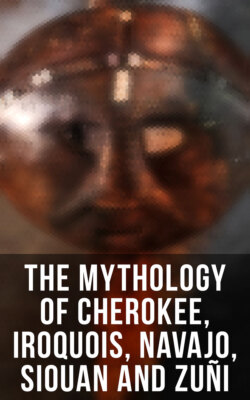Читать книгу The Mythology of Cherokee, Iroquois, Navajo, Siouan and Zuñi - James Mooney - Страница 237
На сайте Литреса книга снята с продажи.
The Sacred Bundle
ОглавлениеA certain young man was very vain of his personal appearance, and always wore the finest clothes and richest adornments he could procure. Among other possessions he had a down feather of an eagle, which he wore on his head when he went to war, and which possessed magical properties. He was unmarried, and cared nothing for women, though doubtless there was more than one maiden of the village who would not have disdained the hand of the young hunter, for he was as brave and good-natured as he was handsome.
One day while he was out hunting with his companions—the Indians hunted on foot in those days—he got separated from the others, and followed some buffaloes for a considerable distance. The animals managed to escape, with the exception of a young cow, which had become stranded in a mud-hole. The youth fitted an arrow to his bow, and was about to fire, when he saw that the buffalo had vanished and only a young and pretty woman was in sight. The hunter was rather perplexed, for he could not understand where the animal had gone to, nor where the woman had come from. However, he talked to the maiden, and found her so agreeable that he proposed to marry her and return with her to his tribe. She consented to marry him, but only on condition that they remained where they were. To this he agreed, and gave her as a wedding gift a string of blue and white beads he wore round his neck.
One evening when he returned home after a day's hunting he found that his camp was gone, and all round about were the marks of many hoofs. No trace of his wife's body could he discover, and at last, mourning her bitterly, he returned to his tribe.
Years elapsed, and one summer morning as he was playing the stick game with his friends a little boy came toward him, wearing round his neck a string of blue and white beads.
"Father," he said, "mother wants you."
The hunter was annoyed at the interruption.
"I am not your father," he replied. "Go away."
The boy went away, and the man's companions laughed at him when they heard him addressed as 'father,' for they knew he was a woman-hater and unmarried.
However, the boy returned in a little while. He was sent away again by the angry hunter, but one of the players now suggested that he should accompany the child and see what he wanted. All the time the hunter had been wondering where he had seen the beads before. As he reflected he saw a buffalo cow and calf running across the prairie, and suddenly he remembered.
Taking his bow and arrows, he followed the buffaloes, whom he now recognized as his wife and child. A long and wearisome journey they had. The woman was angry with her husband, and dried up every creek they came to, so that he feared he would die of thirst, but the strategy of his son obtained food and drink for him until they arrived at the home of the buffaloes. The big bulls, the leaders of the herd, were very angry, and threatened to kill him. First, however, they gave him a test, telling him that if he accomplished it he should live. Six cows, all exactly alike, were placed in a row, and he was told that if he could point out his wife his life would be spared. His son helped him secretly, and he succeeded. The old bulls were surprised, and much annoyed, for they had not expected him to distinguish his wife from the other cows. They gave him another test. He was requested to pick out his son from among several calves. Again the young buffalo helped him to perform the feat. Not yet satisfied, they decreed that he must run a race. If he should win they would let him go. They chose their fastest runners, but on the day set for the race a thin coating of ice covered the ground, and the buffaloes could not run at all, while the young Indian ran swiftly and steadily, and won with ease.
